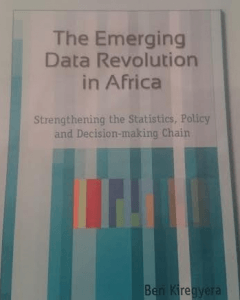Book Review: The Emerging Data Revolution in Africa
 Despite the African continent, being rich in natural and human resources, Africa has suffered some deficiencies, among them weak statistical data.
Despite the African continent, being rich in natural and human resources, Africa has suffered some deficiencies, among them weak statistical data.
Significantly exacerbating the matter was the lack of interest among important institutions involved in development discourse on the continent, to address the issue of weak statistical data. This further weakened development planning and strategy for a very long time, stunting for an equally long time economic development, which should have been a matter of fact.
However, Dr. Ben Kiregyera, like most other Africans dedicated to a more productive approach to realigning the continent’s development efforts, seems to have taken a personal responsibility by using his expertise to address the subject of statistical data on the continent, in his book.
The book is comprehensive, capturing the history and role of statistical data in the development efforts on the continent.
He recognizes the groups that took front rows in what is a long drawn battle of sorts to rationalize the importance for the availability and use of credible statistical data that is wholly local. And this long drawn battle he documents so accurately in a style that only a good storyteller could do.
The story as he portrays it, was dark at some point – he captures the story of how the statistics unit of the ECA was ‘put on ice’ during a restructuring after 39 years, and then abolished.
If any incident mirrored the weak position of statistics in Africa, and how it was perceived at that time, that singular action does in a poignant way.
Even though the path was rough, pan-African organizations such as the African Development Bank, the African Union and the ECA itself, which once shut its statistics unit began giving statistics some recognition and acknowledging the subject’s important role in their operations.
Dr. Kiregyera took pains to show how various organizations at this point started making a case for statistics and championing the relevance of the discipline in development discourse. He systematically showed how these groups pushed for the inclusion of statistics in economic planning to try and get buy-ins from stakeholders, citing protocols, resolutions and agreements at various meetings over the years.
The author strongly believes that the momentum gathered by the various statistical groups and movements on the continent has galvanized the data community to trigger a data revolution in Africa. Indeed, he believes that the revolution has already begun.
The book isn’t a typical statistics literature that teaches only the technicalities of the subject, it is a valuable resource for understanding Africa and how the subject of statistics, the organizations and systems that it connects and its overall usefulness to a continent that must take the challenges of its own development into its own hands.
An interesting part of the book is however, the section that identifies and lists individuals who have made significant contributions to statistics in Africa. The book lists seven extra-ordinary African statisticians whose role and contributions left indelible marks on the subject on the continent.
I am doubtful though, that there aren’t foreigners who could legitimately fit into this category, because the history of Africa is littered with evidences of foreigners who have made enormous contributions in the building of this continent, taking into account the impact of colonization and the fact that the education systems, were started by foreigners.
In conclusion, I would like to say the book is a valuable asset, that any professional, development worker, those who use data to make economic decisions or planning, or student of statistics must own.
Author: Dr. Ben Kiregyera
Reviewer: Emmanuel K. Dogbevi
